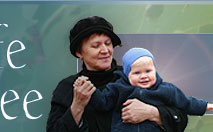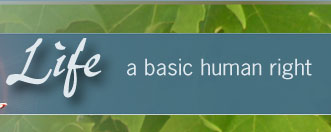
Statement of LifeTree
Concerning
S1046 (Advance Directives)
Before the NC House Health Committee
July 10, 2007
Alert:
OPPOSE H634
Rewritten 7/27/07, H634 is now an advance
directives bill, with the same dangerous, confusing forms and language of S1046.
Click here for the NC General Assembly record of H634 and to read the bill itself (look for the latest edition).
S1046:
Click HERE to read S1046 and its complicated forms.(PDF)
S1046 history HERE. |
|
The change in terminology from “life sustaining” procedures to “life prolonging” measures is a clear indication that there is far more being proposed in S1046 than what its “improve and simplify” title would have us believe. If it becomes law, this bill will greatly improve the odds that the incidence of passive euthanasia will significantly increase.
This will occur because the so-called simplifications will radically expand the scope for use of current advance directives and because the bill will sanction use of the MOST form which is a doctor’s order permitting a broad range of non-treatment but without even the safeguards of witnesses and specific triggering events associated with advance directives.
Section 14 of the bill will give legislative sanction to the MOST form [see insert] by adding it to the legislation which authorizes DNR (Do Not Resuscitate) Orders. Four main reasons why this is dangerous are:
- MOST is patterned after the POLST Paradigm developed by right to die advocates in Oregon. It offers different levels of limiting medical treatments regarding use of antibiotics, artificially administered nutrition and hydration, cardiac monitoring, hospital admission, etc. without even the safeguards associated with advance directives.
- What the content of this form will be is not revealed in this legislation which in its other sections at least tells us what the content of the approved Advance Directive and Health Care Power of Attorney forms will look like.
- We do know that it will have the effect of a Doctor’s order, although it may be signed by a physician, physician’s assistant, or nurse practitioner.
- Consent (however informed) is not limited to that of the patient. A long list of patient representative signatures can constitute consent to the MOST order —even after the fact. That list will now (under the proposed bill) include any individual with an “established relationship” to the patient who can reliably convey the patient’s wishes. If I step forward and identify myself as such a person, how is anyone to know differently?
S1046 will expand the scope of the living will and make it easier to limit an unwanted end of life under circumstances which may constitute less than fully informed consent. Here is a quick comparison of current law and some of the more dangerous proposed changes in this bill:
Under present law, two physicians must determine that the patient who has executed the living will has a terminal and incurable condition or is diagnosed as in a persistent vegetative state.
The proposed bill changes the living will triggering conditions as follows.
- Terminal has become an incurable and irreversible condition which will result in death in a relatively short period of time.
- PVS has been greatly expanded into being unconscious and without likelihood to regain consciousness.
- This legislation, moreover, breaks new ground by identifying advanced dementia or any other condition resulting in the substantial loss of cognitive ability (which), to a high degree of medical certainty is not reversible as a third condition under which “life prolonging” measures such as food and water may be withheld or withdrawn. It matters not that the demented person’s death is not medically imminent nor is there concern whether food and water is otherwise medically inappropriate.
The so called “right to die with dignity” is moving our society towards a “duty to die” when one becomes unproductive whether by age or by disability. For this state’s legislature to add advance dementia and loss of cognitive ability as conditions under which people are invited to authorize being starved and dehydrated to death is beyond common sense and reason. It radically devalues life.
Many other provisions of this bill would greatly increase the chances that advance directives will be executed under circumstances of less than informed consent.
- What used to be 2 witnesses qualified by their specific absence of conflicting interests would now become 1.
- The definition of a qualified witness now disqualifies only a paid employee of a health care institution. This means that a volunteer at the nursing home would now be qualified to witness an advance directive.
- The “batting order” of people who can consent to denial or withdrawal of treatment including food and water will now include an(y) person who can show an “established relationship” which qualifies just about anyone.
This bill needs a number of significant changes before it deserves favorable consideration by this committee. The most critical changes are listed in order below.
1) Eliminate all references to MOST in Section 14 of the bill. This eliminates the need for this section entirely as all it does is give side-door legislative sanction to MOST in the first place.
2) Eliminate all reference in the bill (and in existing law) to advanced dementia as a triggering condition bringing an advance directive into effect. (Section 11a of the bill in Paragraph (c).)
3) The rewrite of 90-321 (c) should not include changing the physician “may rely” into “shall follow.”
4) Leave the two other statements of triggering conditions for the Living Will Advance Directive as they are in current law. (Also in Section 11a of the bill)
5) Remove # 7 from the batting order of those who can give consent to withholding or withdrawal of treatment, etc. (Section 12 of the bill rewriting G.S. 90-322)
6) Disqualify as a witness any employee paid or unpaid of a health care provider or institution. (Section 2 of the bill definitions; in (6) remove the word “paid” from the definition of a qualified witness.)
7) Be honest in your terminology. There is no reason to change the term “life sustaining procedures” to “life prolonging measures” (Section 2 of the bill defining terms and then in numerous places elsewhere in the bill.)
Elizabeth D. Wickham, PhD
Executive Director, LifeTree
www.lifetree.org
PO Box 17301
Raleigh, NC, 27619
919-785-0855
|







